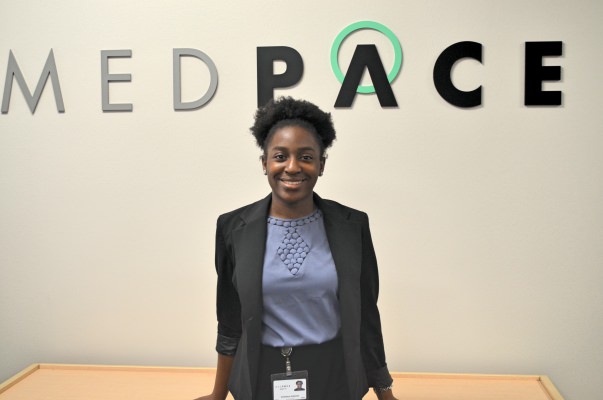My Career As A Clinical Research Associate at Medpace
Tell me about yourself. How did you get interested in science? What program were you in and why were interested in this program?
 I am a second generation Nigerian American. I have lived in Texas my entire life, I was born in Houston, I moved to San Antonio for school, and I am now currently living in Dallas
I am a second generation Nigerian American. I have lived in Texas my entire life, I was born in Houston, I moved to San Antonio for school, and I am now currently living in Dallas
for my new position with Medpace.
I really found an interest in science in my 9th grade
high school biology class. In this class I was really challenged in the sciences in a way I had never been before. I have always loved a good challenge
and biology truly offered that for me. I was intrigued by the technique, memorization, practicles, and more that was all involved in the natural science.
However, mathematics has always been my favorite subject, no matter what part of the world you are in, numbers are always the same. From young I struggled with reading and language arts, so it was almost natural for me to find a love for math. Between my intrigue for the sciences and my passion for mathematics, biomedical engineering almost “fell in my lap!”
After completing my bachelors in mathematics with a minor in biology at the University of Texas at San Antonio. I really wanted to pursue a career that I could incorporate my love for mathematics and science. After doing further research into the dual program and professors, I knew I could find my place again in this masters program. I began
working in the Vascular Biofluids and Biomechanics Laboratory under the direction of Dr. Ender Finol, where I concentrated on the detection of abdominal aortic aneurysms. I recently graduated in May 2015 from the University of Texas Health
Science San Antonio and University of Texas at San Antonio Graduate Dual Biomedical Engineering program.
After months of diligently searching for work, networking, and much more I began the hiring process for Medpace as a clinical research associate. I have been working at Medpace for almost a month now and it has been such a great learning experience so far.
Why did you pick the Graduate School of Biomedical Sciences at UT Health
Science Center? How did you learn about us?
I choose the Graduate School of Biomedical Sciences at UT Health Science Center because I really loved the dual program and my ability to utilize the resources at two highly rated universities, their professors, and students.
Being a top research health center offers many research, learning, and growing opportunities on and off campus through classes, seminars, and conferences.
Being a UTSA alumni, I heard about the program on campus, and did my own research on specifics of the program. Looking on different internet sites ratings and credentials, the feedback I obtained more knowledge about the Graduate School of Biomedical Sciences at UT Health Science Center’s program.
What are some of your favorite memories in graduate school? Did you feel adequately prepared for your future career?
One of my favorite memories of graduate school is the long hours spent in the lab trying to successfully learn how to use SolidWorks, design a vascular prototype, and 3D print my prototype. It took many days, nights, but after weeks I could see the success of my hard, all the assistance and support of other lab mates to help me achieve my goal.
I do believe that this program, gave me not only book knowledge, but tangible skills to apply in the work field, as far as determination to reach a deadline. Hard work, to balance working in the lab, a part-time job, and school work all at once. In addition, flexibility, being able to adjust around deadlines for research that may not be working out on the current timeline set-up for the work.
What are you doing at Medpace? Do you like it? Why or why not? How did learn about this position and what about it intrigued you?
 Medpace is a private clinical research organization, at this company I will hold the title of Clinical Research Associate. I will be responsible for performing different
Medpace is a private clinical research organization, at this company I will hold the title of Clinical Research Associate. I will be responsible for performing different
activities related to clinical research trials with pharmaceuticals and medical
devices.
Clinical Research Associate ensures compliance with: the clinical trial protocol, checks clinical site activities, makes on-site visits, reviews Case Report Forms (CRFs), communicates with clinical research coordinators, assure the protection of the rights, safety and well being of human study subjects, make certain that the scientific integrity of the data collected is protected and verified, and
assure that adverse events are correctly documented and reported.
I am already loving Medpace! The professional but laid back culture makes Medpace a safe haven for employees to learn, grow, and teach. Medpace culture is to “empower our teams to employ their unique talents and experience to take an assertive approach to research, problem solving, and ultimately supporting our partners.” Medpace has the “PACE” training program for new inexperienced hires. The PACE program is a 6 to 12 month program that intensely trains employees with workshops, exercises, and exams.
I learned about Medpace through MiracleWorkers, a third party job search site that listed the position for Clinical Research Associate in Dallas. This job requires a high amount of traveling for clinical studies. All these elements of this job intrigued my different interest from research, traveling to the clinical studies, which is a new aspect to me. Also, Medpace offers an intensive CRA training program, this is rare for companies to offer such a program. “Every Clinical Research Associate (CRA) receives comprehensive, hands-on training in an individualized curriculum called PACE (Professionals Achieving CRA Excellence) Training Program.” I love the investment Medpace puts in each individual employee
Tell me a bit about your day in your job.
 As a clinical research associate still in training my day begins around 7:30 a.m. and ends at 4:00 p.m. In between this time I am working on training
As a clinical research associate still in training my day begins around 7:30 a.m. and ends at 4:00 p.m. In between this time I am working on training
sessions through Medpace’s PACE training program. “PACE prepares CRAs through interactive discussions and hands on job-related exercises and practicums. In-house and field-based training is supplemented with clinical research
departmental core rotations, that provide additional learning of the drug/device development and approval process.
Upon completion of PACE, Medpace CRAs continue to receive ongoing study-specific training led by the industry’s top therapeutic and regulatory professionals. This ensures each associate is an expert on your protocol. Our unique team structure is designed to be the most streamlined in the industry. Reporting lines are clear, open and transparent for everyone involved – guaranteeing appropriate support and oversight for each CRA.”*
The PACE program is very hands of when it comes to supervision, so how my day is planned is mainly up to me with some guidance from my manager, mentor, and other employees. I can have one training session in a day or three if I want. I enjoy the hands off structure because it daily drives me to strive beyond the call of duty and truly grasp all the concepts of the industry. “Medpace CRAs are dedicated to an average of only two protocols at a time, empowering them to focus on process excellence, understanding the intricate issues of the protocol and/or indication (disease), and ensuring site compliance.”
What would you tell other graduate students interested in the career you have?
 To students interested in clinical research monitoring, GO FOR IT! I have only been working at Medpace for about a month now, and I truly enjoy coming into work. The work culture and environment is great for recent graduates, especially with Medpace’s PACE training program for
To students interested in clinical research monitoring, GO FOR IT! I have only been working at Medpace for about a month now, and I truly enjoy coming into work. The work culture and environment is great for recent graduates, especially with Medpace’s PACE training program for
entry level positions.
If you do not have a lot of work experience, but love
aspects of research, I believe clinical monitoring will be a great field for you. Daily, I use my knowledge of the sciences, while also learning more in dept about different drugs, mechanisms, and more. I am able to interact with people, working on my public speaking and networking all at work. I believe this field will open up so many doors of opportunity to move in the career or even open up doors to different avenues of research.
After working in a laboratory throughout graduate school, then getting a job at Medpace working with clinical studies, I am able to see another side of research and I am very grateful for the opportunity. Plus, I get to wear jeans in the office!
Lastly students, if you are truly interested in this career path, do your research about different clinical research organizations, what is required to be a clinical research associate or monitor, and find the company that would be best befitting for you.
* Information found on Medpace website.
